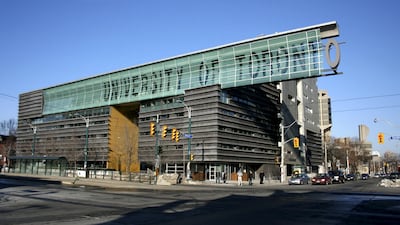Canada is becoming a top choice study destination for UAE students, a new poll suggests.
The poll of 300 UAE youths chose the North American country as their top choice for study abroad, ahead of the United States and the United Kingdom. Most respondents were from India, Pakistan, the Philippines and the GCC, and about 76 per cent were high school pupils.
The independent poll was commissioned by the Canadian immigration firm Beeton and Co after a sharp increase in applicants for study visas in Canada.
“It was a surprise,” said Julie Beeton, a Canadian immigration lawyer and the firm’s managing director. “Over the last year I’ve noticed a huge increase in clients wanting to know about study abroad programmes, either for master's degrees or for their kids. I had a number of clients that came to me after the Trump travel bans. They were studying in the US and wanted to change and study in Canada.”
This autumn, universities and colleges in Canada have welcomed a growing number of Middle Eastern students. Universities recorded a significant increase in applicants and enrolments in the past 12 months.
At the University of Alberta, GCC applicants increased by 30 per cent compared to this time last year, while the University of Toronto saw a 50 per cent uptick in applicants and enrolment in students from the Middle East, Pakistan and Turkey.
International applicants at the University of Alberta have increased by 25 per cent overall.
“We have seen a steady growth in Canada altogether over the last 10 years but this year has not only been a growth but a big jump,” said Britta Baron, vice-provost and associate vice-president (International). “For most of the big research-intensive universities like ours, that has been particularly true.”
She credits stronger international recruitment strategies, a weak Canadian dollar and what she’s dubbed "the Trump factor".
_____________________
Read more:
Immigration puts Middle Eastern students off studying in US
'It feels like home': how NYUAD is attracting students from Texas to Afghanistan
_____________________
“There is the Trump factor, no doubt, and we see that particularly in countries that were or are affected by the travel ban,” said Ms Baron. “There’s a huge increase out of Iran, like three digits.”
Ms Baron said her counterparts south of the border had not seen much growth or decline in registrations for the 2017-2018 academic year. “I work a lot with my colleagues in the United States,” she said. “Altogether there is no evidence of dramatic decline in the undergraduate level; when Trump came to power we were already in the middle of a recruitment cycle. The full impact of the Trump factor is not going to be seen until the next cycle.”
The increase in Middle Eastern applicants at the University of Toronto was comparable to the increase for international students overall. Partial credit for Canada’s growing popularity was given to the image of its prime minister, Justin Trudeau.
“They know that our prime minister has spoken about getting the best talent for the innovation economy and is doing so by looking around the world and trying to attract the best and the brightest from around the world,” said Ted Sargent, the University of Toronto's vice-president international, who visited Dubai in early October to meet with alumni and potential students. “Canada is really looking outward rather than looking inward.”
A few weeks ago, the University of British Columbia (UBC) in Vancouver welcomed more than 100 new students from the Emirates, nearly a 50 per cent increase from last year. Applicants from the Middle East for the 2017-2018 academic year increased 14 per cent since last year, consistent with the increase in international applicants.
"Interest in UBC from Middle East applicants has grown steadily over the past several years, and this year was no different," said Karen McKellin, the executive director of UBC's International Student Initiative.
In 2014, Canada’s federal government announced its target to nearly double the country’s international student population from 239,000 in 2011 to 450,000 in 2022. Its international education strategy listed the UAE and Saudi Arabia among 10 key market countries.
Currently, a third of Canada’s international students are from China, according to the non-profit Canadian Bureau for International Education. There is growing engagement with the Emirates, while enrolment from Saudi Arabia, traditionally the strongest GCC market, drops as the Kingdom tightens its budget and cuts scholarships to mitigate falling oil prices. Enrolment from Saudi Arabia graduates at the University of Alberta are “in free fall”, said Ms Baron.
International students in Canada injected about CA$11.4 billion (Dh33.2bn) into the economy in 2014 and those who come, settle. According to the CBIE, half of Canada's international students plan to apply for permanent residency.

